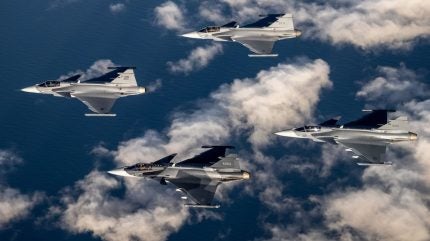
Colombia’s President Gustavo Petro announced that the country intends to acquire the JAS 39 Gripen E/F combat aircraft.
In a post on the social media platform X on 3 April, Petro confirmed a letter of intent had been signed to that effect, and that the acquisition fulfils Colombia’s “strategic air defence” requirement.
During a press conference on the same day, the Chief of Staff for the Colombian Aerospace Force, Carlos Silva Rueda, said the service will order between 16 and 24 aircraft.
He also stressed the need to cultivate an adequate industrial and training model to support the lifecycle of the aircraft. The Colombian government has requested an offset agreement to transfer the responsibility of manufacturing and assembly to the country as part of the negotiations with Saab, the original equipment manufacturer.
Such a model would require Saab, based in Sweden, to increase its footprint in Colombia, investing heavily in the nation’s “cyber defence, aeronautical industry, and space.”
This industrial package will be a “comprehensive” one, described Saab CEO Micael Johansson. Although, Silva emphasised that “this does not happen overnight”.
Colombia will be the second South Amercian nation to procure the Swedish fighter jet after Brazil, a country that currently has 36 units under contract, for which an offset package has already been established.
According to GlobalData intelligence, Colombia currently operates two Israeli C-12 Kfir and 25 Embraer 314s.
Deliberation over decades
During the press conference, the Minister of National Defense, Pedro Arnulfo Sanchez, thanked France, Spain and the US for presenting their own sovereign fighter jets: Dassault Rafale, Eurofighter Typhoon, and the Lockheed Martin F-16 respectively.
It appears that that Gripen’s manoeuvrability and low cost better suit Colombia’s strategic air defence requirement that Petro referred to in his announcement.
GlobalData also indicate that one driver of defence spending in Colombia is on its border disputes. In 2017, Venezuela invaded and forcefully occupied a small part of Colombian territory in the border area separated by the Arauca River.
Global leaders considered this international territorial breach as a desperate attempt by the Venezuelan government to shift attention away from various domestic issues, such as hyperinflation, food shortages, and massive social unrest. The unstable political situation in the neighbouring country shows no sign of abating today.



